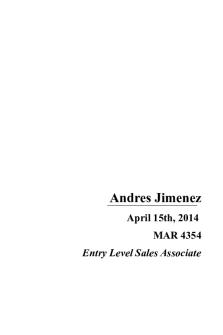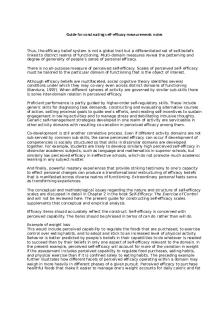Career Self-Efficacy Scale PDF

| Title | Career Self-Efficacy Scale |
|---|---|
| Author | Bianca Castro |
| Course | Behavioral Counseling and Self-Management |
| Institution | California State University Los Angeles |
| Pages | 1 |
| File Size | 35.8 KB |
| File Type | |
| Total Downloads | 40 |
| Total Views | 140 |
Summary
The career self-efficacy scale is to help those who are working the project A self assessment final project. ...
Description
Career Counseling Self-Efficacy Scale Karen M. O’Brien, Mary J. Heppner, Lisa Y. Flores, and Lynette H. Bikos Below is a list of activities regarding counseling. Indicate your confidence in your current ability to perform each activity according to the scale defined below. Please answer each item based on how you feel now, not on your anticipated (or previous) ability. Not Confident 0
1
Moderately Confident 2
3
Highly Confident 4
1. Select an instrument to clarify a career client’s abilities. 2. Provide support for a client’s implementation of his/her career goals. 3. Assist a client in understanding how his/her non-work life (e.g., family leisure, interests, etc.) affects career decisions. 4. Understand special issues related to gender in career decision-making. 5. Develop a therapeutic relationship with a career client. 6. Select an instrument to clarify aspects of a career client’s personality which may influence career planning. 7. Explain assessment results to a career client. 8. Terminate counseling with a career client in an effective manner. 9. Understand special issues related to ethnicity in the workplace. 10. Understand the special issues that lesbian, gay, and bisexual clients may have in career decision-making. 11. Provide knowledge of local and national job market information and trends. 12. Choose assessment inventories for a career client which are appropriate for the client’s gender, age, education, and cultural background. 13. Assist the career client in modulating feelings about the career decision-making process. 14. Apply knowledge about current ethical and legal issues which may affect the career counseling process. 15. Understand special issues present for lesbian, gay, and bisexual clients in the workplace. 16. Communicate unconditional acceptance to a career client. 17. Select an instrument to assess a career client’s interests. 18. Select an instrument to clarify a career client’s values. 19. Understand special issues related to gender in the workplace. 20. Understand special issues related to ethnicity in career decision-making. 21. Listen carefully to concerns presented by a career client. 22. Synthesize information about self and career so that a career client’s problems seem understandable. 23. Help a career client identify internal and external barriers that might interfere with reaching his/her career goals. 24. Use current research findings to intervene effectively with a career client. 25. Be empathic toward a career client when the client refuses to accept responsibility for making decisions about his/her career. Total Score:
0 1 2 3 4 0 1 2 3 4 0 1 2 3 4 0 1 2 3 4 0 1 2 3 4 0 0 0 0
1 1 1 1
2 2 2 2
3 3 3 3
4 4 4 4
0 1 2 3 4 0 1 2 3 4 0 1 2 3 4 0 1 2 3 4 0 0 0 0 0 0 0 0
1 1 1 1 1 1 1 1
2 2 2 2 2 2 2 2
3 3 3 3 3 3 3 3
4 4 4 4 4 4 4 4
0 1 2 3 4 0 1 2 3 4 0 1 2 3 4 0 1 2 3 4...
Similar Free PDFs

Career Self-Efficacy Scale
- 1 Pages

Syllabus Career
- 9 Pages

Scale vineland
- 1 Pages

Time scale
- 4 Pages

Likert Scale
- 2 Pages

Career project
- 14 Pages

RIASSUNTO SCALE
- 2 Pages

GRIT scale
- 3 Pages

Career counseling
- 3 Pages

Career Anchors
- 6 Pages

BMIS Scale
- 1 Pages

Scale construction
- 5 Pages

AVPU Scale
- 1 Pages

Geriatric Depression Scale (GDS
- 13 Pages

3.3.3 Economies of scale
- 7 Pages

FALL MORSE SCALE
- 11 Pages
Popular Institutions
- Tinajero National High School - Annex
- Politeknik Caltex Riau
- Yokohama City University
- SGT University
- University of Al-Qadisiyah
- Divine Word College of Vigan
- Techniek College Rotterdam
- Universidade de Santiago
- Universiti Teknologi MARA Cawangan Johor Kampus Pasir Gudang
- Poltekkes Kemenkes Yogyakarta
- Baguio City National High School
- Colegio san marcos
- preparatoria uno
- Centro de Bachillerato Tecnológico Industrial y de Servicios No. 107
- Dalian Maritime University
- Quang Trung Secondary School
- Colegio Tecnológico en Informática
- Corporación Regional de Educación Superior
- Grupo CEDVA
- Dar Al Uloom University
- Centro de Estudios Preuniversitarios de la Universidad Nacional de Ingeniería
- 上智大学
- Aakash International School, Nuna Majara
- San Felipe Neri Catholic School
- Kang Chiao International School - New Taipei City
- Misamis Occidental National High School
- Institución Educativa Escuela Normal Juan Ladrilleros
- Kolehiyo ng Pantukan
- Batanes State College
- Instituto Continental
- Sekolah Menengah Kejuruan Kesehatan Kaltara (Tarakan)
- Colegio de La Inmaculada Concepcion - Cebu